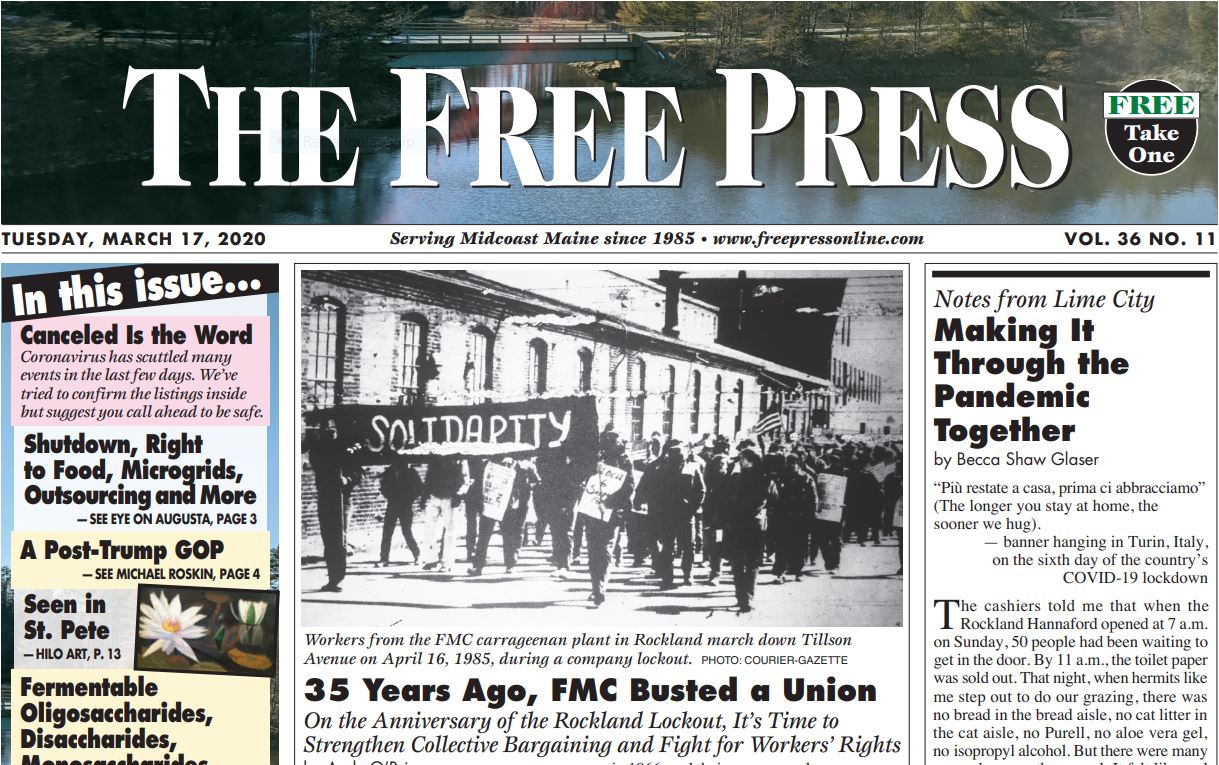by Becca Shaw Glaser March 17, 2020, The Free Press

“Più restate a casa, prima ci abbracciamo” (The longer you stay at home, the sooner we hug).
— banner hanging in Turin, Italy, on the sixth day of the country’s COVID-19 lockdown
The cashiers told me that when the Rockland Hannaford opened at 7 a.m. on Sunday, 50 people had been waiting to get in the door. By 11 a.m., the toilet paper was sold out. That night, when hermits like me step out to do our grazing, there was no bread in the bread aisle, no cat litter in the cat aisle, no Purell, no aloe vera gel, no isopropyl alcohol. But there were many more shoppers than usual. It felt like real life, but strange — more like a dream, with a dazed fragility in the air.
A young father was wearing a blue facemask; his little child also wore one. They
had paused by the depleted bottled water aisle. “This is so weird, right?” The father was scared. He was having chills and sniffles. He was worried he might have the novel coronavirus disease, COVID-19; he was especially worried that his loved ones could get it. I offered that he likely didn’t have it because he hadn’t had a fever, and about 90 percent of people with COVID19 get a fever. But I also suggested, just in case, that he call to get it checked out. I felt the weakness of our entire health care system, how so much of it is for profit, the wafer-thin contingency on which most people in this country live. In other countries they are testing people by the thousands, and yet I knew, in this, the richest country on
earth, the doctors would likely not test him, even as desperately scared as he was.
Each day now, something enormous changes: the schools close, the infection and death rates rise, large gatherings are banned, and in other states and countries, restaurants, bars, movie theaters and cafes are being closed. It’s scary to feel like things are so out of our control. But in this frightening and unusual space, there’s also room for connecting with strangers. “What are you doing to manage?” “What
might you need to feel safe?”
The father said it would help him feel safer to feel we were getting through this as a community, and that he hopes we won’t lose anyone.
Another man at Hannaford told me, “What’s most popular now is toilet paper, beer, eggs … and ammo.” “Really?” Earlier that day, his daughter had brought eggs to Hospitality House. I think we should assume that as a community, and world, we’re going to end up more in the giving-eggs-away scenario than the apocalyptic ammo scenario. We may not, at the moment, have plentiful toilet paper access on a daily basis, but grocery stores and pharmacies have remained open even in the countries most affected by COVID-19.
Still, it is all very scary with so many unknowns. Doctors in Italy are being forced to make horrific decisions: with so many people desperately ill, and not enough respirators to go around, they are deciding who gets to live, and who dies. In China, two young health workers were both critically ill with COVID-19. One fully recovered, and one who had seemed close to recovery, suddenly died.
As a country, we could be in much better shape to handle this if Susan Collins hadn’t demanded cutting $870 billion for pandemic flu preparations in the 2009 economic stimulus package. And Trump put us in danger by firing the entire U.S. pandemic response team in 2018 and never replacing them, by refusing to use COVID-19 testing kits from the World Health Organization, then making and distributing faulty testing kits, and gravely limiting access to testing.
I am worried. I am especially worried for those who will lose their jobs, those who are poor, elderly, un-housed and without health care. But I am hopeful too. Already, mutual aid support networks are popping up in response to COVID-19. On Facebook, there are at least two local groups for people to collaborate on meeting one another’s needs for childcare, rides, food delivery, toilet paper, fundraising for those who lose jobs, mental health support, etc.: Maine
Coronavirus Community Assistance and Midcoast Collective Care. Check them out. The Southern Maine Democratic Socialists of America also set up a mutual aid network (southernmainedsa.org/covid) and a list of demands for Maine state and local government to address during the pandemic, including a moratorium on all evictions and shutoffs; no cooperation with ICE; 14 days paid sick leave; free
COVID-19 testing; release of all pre-trial prisoners whose bail hasn’t been met; plans for housing the sick; transportation; accessible medical teams and more.
Please take care of yourselves; reach out, both to offer and to ask. Even as we aim to keep our “social distance,” know that true self-care means caring for the community as a whole.